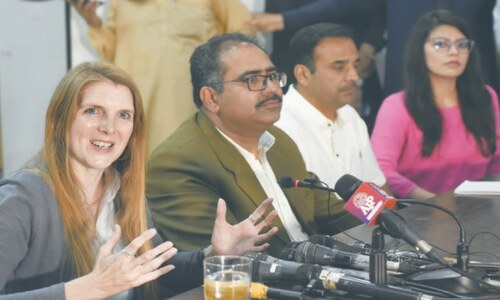ISLAMABAD: The ex-parte proceedings against defunct finance minister Ishaq Dar hang in the balance as the Islamabad High Court (IHC) has raised certain questions related to his trial.
Subsequently, NAB has to respond to the queries of the IHC by January 17 when the court will resume hearing of a petition filed by Mr Dar.
The IHC on December 20 stopped the accountability court from proceeding against Mr Dar after he pointed out anomalies in his trial in the assets reference filed against him on the direction of the Supreme Court.
The apex court in its July 28, 2017, verdict had directed NAB to file four references - three against Nawaz Sharif and his family and one against Mr Dar - in the accountability court with the direction to the accountability judge to complete the trial in six months.
The accountability court declared Mr Dar a proclaimed offender, initiated the process of confiscating his properties and started the ex-parte proceedings against him with a fast pace until December 20 when the IHC stopped the proceedings till January 17.
The reason why the IHC issued the stay order against Mr Dar’s trial is that the accountability court relaxed the provision of the National Accountability Ordinance to expedite proceeding against the defunct minister, which according to the defence counsel is benefiting the prosecution.
Under the Criminal Procedure Code, an accused is declared a proclaimed offender at least after 30 days of the issuance of a proclamation but in Mr Dar’s case the accountability judge Mohammad Bashir by invoking section 17 (c) of the National Accountability Ordinance (NAO), which empowers him to relax any procedural law, reduced the mandatory timeframe to 10 days.
The IHC division bench, comprising Justice Athar Minallah and Justice Miangul Hassan Aurangzeb, in its order issued on Tuesday observed: “The questions which emerge for our consideration are as under: whether time prescribed under section 87 of the Criminal Procedure Code 1898 can be curtailed under section 17 (c) of the National Accountability Ordinance 1999 in the absence of exceptional circumstances, whether the accountability court has exercised its discretion in accordance with law and whether in the facts and circumstances of the instant petition, particularly when the petitioner wants the trial to continue, initiating proceedings against him were in consonance with law.”
The court also asked: “Whether the impugned orders are sustainable on the touch stone of reasonableness?”
During the hearing on December 20, the court reminded NAB that as per the prevailing legal practice the accused had to be treated as ‘favourite child of law’. It means that in case the court could dispense with any provision of CrPC or NAO, it should favour the accused person.
However, in Mr Dar’s trial, the accountability court is invoking its discretionary power not to benefit the accused but to ease the prosecution, said Advocate Qausain Faisal Mufti, the counsel for Mr Dar.
Talking to Dawn, the lawyer said the accountability court had invoked section 17 (c) of NAO twice against Mr Dar, adding at the time of indictment the court gave him less than 48 hours whereas under the routine practice courts frame charges at least seven days after supplying the copies of reference to the accused person.
Likewise, he said, the court under section 87 of the CrPC has to give at least 30 days to Mr Dar after issuance of proclamation but by invoking the said section it reduced the timeframe and declared the defunct minister as a proclaimed offender after 10 days.
Advocate Mufti said Mr Dar had even agreed on the continuation of trial through a pleader since due to his ailment he was unable to personally attend the proceeding. But the prosecution pointed out that under section 540-A of the CrPC, single accused cannot be given an exemption from personal hearing.
He said the accountability judge could relax the rule by invoking section 17 (c) for Mr Dar but he didn’t extend such a relief to him.
The IHC’s stay order has already delayed the swift conclusion of the trial proceedings. In the ex-parte proceedings, the accountability court has recorded the testimony of six witnesses.
According to legal experts, since the IHC has noted that there were not “exceptional circumstances” for which the accountability court had invoked section 17 (c) and that the accused wanted continuation of trial, it would become difficult for the trial court to continue the ex-parte proceedings.
Published in Dawn, December 27th, 2017














































Dear visitor, the comments section is undergoing an overhaul and will return soon.